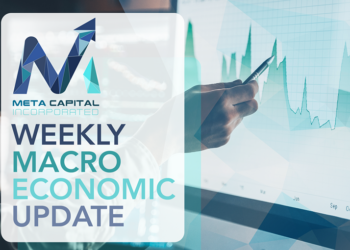-
Thailand Microeconomic Weekly Update #60
THAILAND MACROECONOMICS WEEKLY UPDATE In February, headline inflation contracted by 0.77{e670f1729e1473da419f727916d262f9386f81ee1a520bff2333d2c02540bcf6} year-on-year, continuing a five-month streak of contraction, while core inflation saw a slight increase of 0.43{e670f1729e1473da419f727916d262f9386f81ee1a520bff2333d2c02540bcf6} YoY, slightly below market expectations. Meanwhile, Energy Minister Pirapan Salirathavibhaga announced that electricity prices for the May-August billing period would remain capped at 4.18 Baht per unit. Household
March 11, 2024 Read more -
Thailand Microeconomic Weekly Update #59
The Social Development and Human Security Minister said the elderly would receive a flat rate welfare payment of 1,000 baht a month up from 600-800 baht. The industrial sentiment index rose to 90.6 points in January from 88.8 points, propelled by increased domestic demand, tourism recovery, and export expansion. In January Thailand exports had a value of 22,649.9 million US dollars rising for a sixth consecutive month in January and were up 10{e670f1729e1473da419f727916d262f9386f81ee1a520bff2333d2c02540bcf6} annually or more than expected. Imports rose 2.6{e670f1729e1473da419f727916d262f9386f81ee1a520bff2333d2c02540bcf6} in January. The national EV board has approved incentives to support the use of electric commercial vehicles the measures will enable companies to deduct expenses.
February 26, 2024 Read more -
Thailand Microeconomic Weekly Update #58
The government’s Digital Wallet Committee on Thursday set up a subcommittee and tasked it with preventing any acts that would go against the handout project’s terms and conditions. The National Credit Bureau (NCB) said on Wednesday. The debt situation of Thai people has taken a turn for the worse with 2.67 million cases. According to the University of the Thai Chamber of Commerce (UTCC), the CCI rose to 62.9 last month from 62.0 in December 2023. However, they maintain the projection that the Thai economy will expand by 3-3.5{e670f1729e1473da419f727916d262f9386f81ee1a520bff2333d2c02540bcf6}. The Cabinet recently approved an additional 560 billion baht ($15.7bln US) in new borrowing for the 2024 fiscal year.
February 19, 2024 Read more -
Thailand Microeconomic Weekly Update #57
The Tourism Confidence Index remained below pre-pandemic levels at 77 but showed improvement from Q3 at a level of 69 this was due to delayed fiscal budget disbursement. Inflation slowed in January, dipping into negative territory of 1.11{e670f1729e1473da419f727916d262f9386f81ee1a520bff2333d2c02540bcf6} due to government measures to reduce energy expenses and fresh food. Department of Energy Business Revealing the overall fuel use in 2023, with the use of gasoline increasing by 3.4{e670f1729e1473da419f727916d262f9386f81ee1a520bff2333d2c02540bcf6} and commercial jet fuel (Jet A1) increasing by 50.9. {e670f1729e1473da419f727916d262f9386f81ee1a520bff2333d2c02540bcf6} and use of LPG increased. While fuel oil Diesel and NGV use decreased. The Bank of Thailand (BoT) reported international reserves on February 2 at 220.8 billion dollars.
February 13, 2024 Read more -
Philippines Microeconomic Weekly Update #56
In the Philippines, a local fintech firm predicts a 67{e670f1729e1473da419f727916d262f9386f81ee1a520bff2333d2c02540bcf6} adoption rate for digital retail payments in 2024, based on the Bangko Sentral ng Pilipinas’ reported 43{e670f1729e1473da419f727916d262f9386f81ee1a520bff2333d2c02540bcf6} average year-on-year growth from 2019 to 2022. Online payments constituted 42.1{e670f1729e1473da419f727916d262f9386f81ee1a520bff2333d2c02540bcf6} of total retail transactions in 2022, up from 30.3{e670f1729e1473da419f727916d262f9386f81ee1a520bff2333d2c02540bcf6} the previous year. The government aims for 60-70{e670f1729e1473da419f727916d262f9386f81ee1a520bff2333d2c02540bcf6} of retail payments to be online by 2028 as per the Philippine Development Plan.
February 6, 2024 Read more -
Thailand Microeconomic Weekly Update #56
OFFC has approved the use of the fund mechanism to subsidize the price of benzene by 1 Baht per liter starting from February 1.Thailand Business Sentiment fell in January, due to the non-manufacturing sector recorded at 48.0, with total order books confidence down from peak sales in New Year’s period. Manufacturing production decreased 6.27{e670f1729e1473da419f727916d262f9386f81ee1a520bff2333d2c02540bcf6} year on year for December from a downturn in car production with high household debt, and increased borrowing costs. Purchasing Managers Index fell to 45.1 in December. The 118,080 Thai nationals who have been working overseas contributed 58.62 billion Baht to the economy in the first quarter of fiscal 2024.
February 6, 2024 Read more -
Thailand Microeconomic Weekly Update #55
IMF projects 4.4{e670f1729e1473da419f727916d262f9386f81ee1a520bff2333d2c02540bcf6} GDP growth for Thailand in 2024, driven by short-term stimulus. Ministry targets 1.99{e670f1729e1473da419f727916d262f9386f81ee1a520bff2333d2c02540bcf6} export growth, citing a rise in rice exports. NESDB reports 1.8{e670f1729e1473da419f727916d262f9386f81ee1a520bff2333d2c02540bcf6} economic expansion in 2023, impacted by contractions in manufacturing and exports. Constitutional Court allows Pita Limjaroenrat’s return as an MP after six months. Thailand’s household debt expected to reach 16.9 trillion baht, 91.4{e670f1729e1473da419f727916d262f9386f81ee1a520bff2333d2c02540bcf6} of GDP, with NPLs estimated at 152 billion baht according to TMB.
January 29, 2024 Read more -
Philippines Microeconomic Weekly Update #55
The Philippine Statistics Authority (PSA) reported that commodity prices continued their downtrend, slowing to 3.9{e670f1729e1473da419f727916d262f9386f81ee1a520bff2333d2c02540bcf6} in December, resulting in a full-year average of 6{e670f1729e1473da419f727916d262f9386f81ee1a520bff2333d2c02540bcf6}. This December rate falls within the forecast range of 3.6{e670f1729e1473da419f727916d262f9386f81ee1a520bff2333d2c02540bcf6} to 4.4{e670f1729e1473da419f727916d262f9386f81ee1a520bff2333d2c02540bcf6} set by the Bangko Sentral ng Pilipinas (BSP) for the month.
January 29, 2024 Read more -
Thailand Microeconomic Weekly Update #54
The government may review the land bridge project if a feasibility study finds that it is not worth of the investment budget. The Thai Bond Market has issued an Investor Caution for MK Real Estate Development because they seek approval for revising the financial terms. The Bank of Thailand has reaffirmed its choice to stay the policy rate at 2.5{e670f1729e1473da419f727916d262f9386f81ee1a520bff2333d2c02540bcf6}, asserting that this decision aligns with the fundamental principle. Digital Wallet might be delayed, said the Deputy Finance minister. He wants to consider all information carefully, especially the Council of State’s legal opinion. The SEC has removed the upper limit on retail investment in real estate and infrastructure-linked initial coin offerings.
January 24, 2024 Read more -
Philippines Microeconomic Weekly Update #54
he Bangko Sentral ng Pilipinas (BSP) is expected to maintain high interest rates due to potential inflation spikes, driven by risks such as increased transport fares, power rates, and oil prices. BSP has initiated the soft launch of the International Transactions Reporting System (ITRS) to monitor cross-border transactions and enhance foreign exchange transaction supervision. Meanwhile, the government raised P19 billion in Treasury bills amid rising demand, indicating expectations that the BSP will keep borrowing costs elevated. The average rates for the 91-day and 182-day T-bills were 5.102{e670f1729e1473da419f727916d262f9386f81ee1a520bff2333d2c02540bcf6} and 5.582{e670f1729e1473da419f727916d262f9386f81ee1a520bff2333d2c02540bcf6}, respectively.
January 15, 2024 Read more

